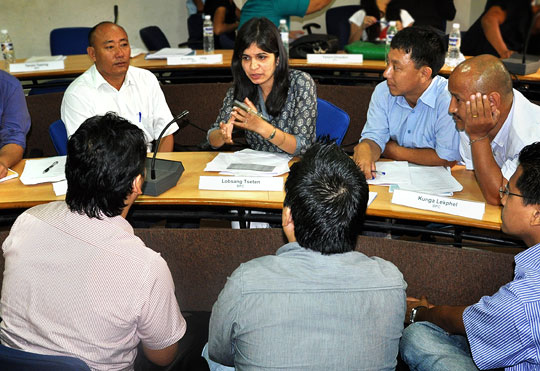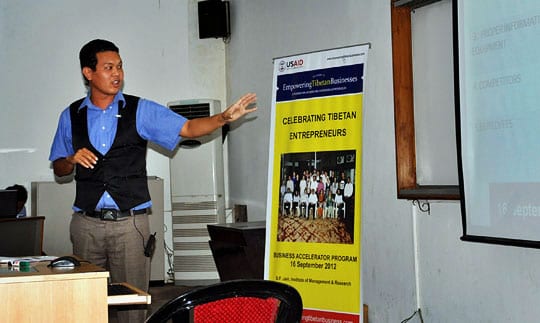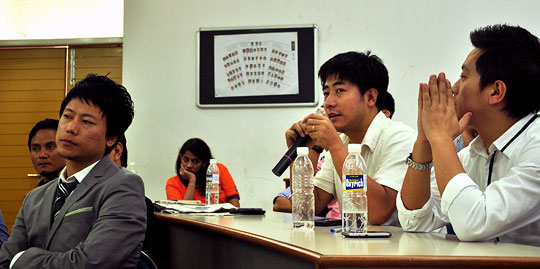Q&A: Developing Entrepreneurship in Tibetan Settlements in India
Sambuddha Bhattacharya discusses his experience working on USAID's Economic Development of Tibetan Settlements (EDOTS) program as as part of the TechnoServe Volunteer Consultant Program (now the TechnoServe Fellows Program) in India.
Sambuddha Bhattacharya joined the TechnoServe Volunteer Consultant Program (now the TechnoServe Fellows Program) in April 2012. He has advised several leading Indian companies at KPMG Advisory and served as Strategy Consultant at India’s largest law firm, Amarchand Mangaldas. An entrepreneur himself, Sambuddha recently co-founded skillhippo.com, an online skills marketplace.

Q: How did you first become involved with TechnoServe, and what is your current role?
Sambuddha Bhattacharya: After five years in corporate strategy and management consulting, I did some reflection and realized that my passion lies in setting up entrepreneurial ventures. I heard about TechnoServe’s Volunteer Consultant program from several friends, one of whom did a stint as a Volunteer Consultant in Ghana. It seemed like an excellent opportunity to apply my consulting experience to the field of entrepreneurship while creating meaningful impact.
Upon joining TechnoServe last April, I started working on program design for the entrepreneurship component of the U.S. Agency for International Development-funded program Economic Development of Tibetan Settlements (EDOTS). Specifically, our team mentors and provides training to 40 Tibetan businesses—both startups and established companies—in growth strategies, management practices, access to finance and more.
Q: What kind of economic challenges does the Tibetan community in exile in India face? How is EDOTS addressing these challenges?
SB: The more than 100,000 Tibetan refugees living in settlements in India face widespread unemployment and other workforce challenges. Many skilled professionals and young Tibetans have left in search of better opportunities overseas, causing brain drain and threatening the preservation of Tibetan culture.
The EDOTS program seeks to create sustainable livelihood opportunities within the Tibetan settlements through two primary components: an agricultural development program, which works with farmers to improve organic production, and a workforce development program, which consists of skill development delivered through career centers and entrepreneurship development delivered through a sub-program called Empowering Tibetan Businesses. That’s my team’s focus.

Q: How did you identify candidates for the Empowering Tibetan Businesses program?
SB: Empowering Tibetan Businesses has two categories: a business accelerator for established, mature businesses and business plan competitions for fresh startups and strong ideas. We decided to invite 20 business accelerator and 40 business plan competition candidates to participate in a one-week business skills training at a leading Indian business school. After the training, participants receive 10 months of TechnoServe in-depth mentoring and advisory support.
We made a focused effort to attract 60 high-potential entrepreneurs, seeking a diverse mix of men and women across different settlements. This was a first-of-a-kind program in the community and our outreach strategy involved a multifaceted approach. First, we presented our program to the settlement officers, the highest government representatives in the settlements. Their support, along with the support of monks, professional associations and the chamber of commerce, was a critical factor to marketing the program and mobilizing the community. To establish recognition, we incorporated Tibetan flag colors in the program logo and approached a renowned Tibetan entrepreneur to be the face of our marketing materials. We then advertised on the largest Tibetan online portal and published articles in prominent media outlets. We announced the program launch during the finals of the Tibetan Soccer Cup, the community’s largest annual sports event, reaching an audience of 5,000. We also hired two local entrepreneurship coordinators, who increased our visibility and credibility across regions in the limited one-month timeframe.
All in all, we traveled to 16 settlements, conducted 50 information sessions and reached approximately 10,000 people. I even had the privilege of meeting the Tibetan prime minister-in-exile and introducing our program over Tibetan butter tea! The response was enthusiastic: We received more than 160 quality entries, exceeding our initial target of 100.
The Business Accelerator component of the EDOTS program is helping Tibetan entrepreneurs to grow their established businesses and create more jobs in their communities.
Q: What kind of difficulties has your team encountered?
SB: The Tibetan entrepreneurship ecosystem is still nascent and poorly structured, presenting a host of challenges as far as analysis and strategy development. We also experienced our share of difficulties with travel and training logistics. The most critical challenge, however, was getting people to buy into the program. EDOTS represents a paradigm shift from monetary donations to technical assistance, in line with TechnoServe’s approach to business solutions to poverty. Many key stakeholders and direct beneficiaries were skeptical, but we were able to demonstrate the long-term value of technical assistance. Early results from the consulting phase of the program helped validate our case. For instance, Kelsang Tsering, a 40-year-old woman entrepreneur, was able to launch the first Tibetan-run peanut butter manufacturing company in Kollegal with the help of TechnoServe.
Q: Describe your experience with TechnoServe so far. What were some of your personal highlights?
SB: Working in TechnoServe India has been an extremely humbling experience. We have a high-quality team on the ground, and the results—from job creation to increased income—are starting to speak for themselves. Perhaps the most rewarding aspect has been sharing the journey of the eight entrepreneurs that I mentor one-on-one. For example, Tenzin Rabtenis is breaking with the established community business model by transitioning a seasonal business of sweater selling to a year-round sweater manufacturing and retail business. Dorjee Palden and Rinchen Dolkar, a father-daughter duo, are expanding their eco-friendly scrap-disposal business, the first Tibetan-owned enterprise of its kind in Mundgod. And the youngest participant in our training, 22-year-old Nyima Dhondhup, has started a cyber café business with grant money awarded from a business plan competition.
I have loved every minute of my nine months here, from learning elementary Tibetan to coaching entrepreneurial pitches. While advising large companies in my previous roles had been stimulating, helping Tibetan entrepreneurs improve their livelihoods is proving to be far more challenging and fulfilling. In fact, I’ve recently extended my original one-year commitment to see the program through its last stage. The larger vision—beyond supporting individual entrepreneurs and creating new economic opportunities in the settlements—is to demonstrate scale and share this entrepreneurship development model for replication.



